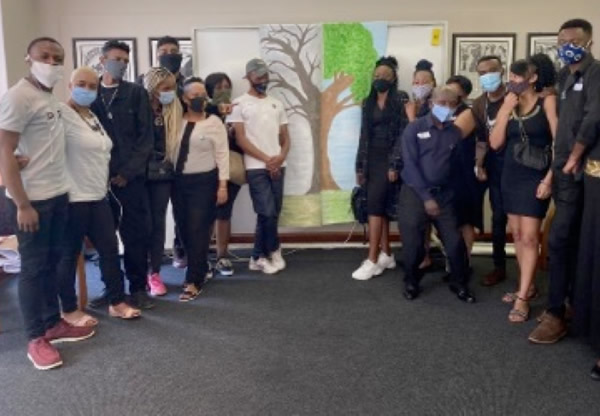A voice for the voiceless
The promotion of justice is an integral part of the work of spreading the good news of salvation. Previously, our Department of Justice & Peace concentrated mainly on fighting against apartheid and redressing the wrongs of the past. Now it focuses on human rights issues such as poverty, gender based violence, conflict resolution, xenaphobia and, more recently, the impact of Covid-19 lockdowns.
Our work includes holding dialogues with affected people and communities, conferences and healing workshops, and collaboration with other community based organisations, NPOs, government and private entities to redress human rights violations.
Impact of Covid-19 lockdowns on poverty and domestic violence
Large numbers of households across the country are currently experiencing tremendous hardship as a direct result of the lockdown. Nosipho, a social worker in Lamontville on the outskirts of Durban, reports:
“The situation in the community is bad; two of every five adults reported that their household lost its main source of income. This has had devastating consequences for food security and hunger. We visited people in the community and stories of them going hungry for several days are common. For those who were already living on the edge of survival, lockdown has been a further blow. The poorest non-grant receiving households have been the hardest hit.”
Gender based violence
“Men in our country have declared war on our women.” This was South Africa’s President Cyril Ramaphosa statement during his address to the nation on the 48th day of lockdown.
South Africa has a deplorable record of gender based violence; women are commonly victims of murder, rape and physical abuse, often inflicted on them by their partners or other family members. Women and children are afraid to go out and even to live in their own homes.
Incidences of rape and physical abuse are seldom reported. Victims may be unaware of their rights and afraid of not being believed, or of suffering further abuse at the hands of the police.
There is also the fear of retaliation from the perpetrator, with whom they will likely continue to live. If the abuser is the main provider, dependent women are afraid that if they report him, he will stop providing food for them and their children.
Trapped with their abusers
The Covid-19 crisis intensified the problems. The home might offer protection against an unseen enemy in the form of a virus, but it is also the place where women are most at risk of suffering abuse at the hands of a partner or family member. During lockdown, they were trapped, with no possibility of escaping from their abusers or calling for help.
Sexual exploitation
As families were confined and young girls spent more time at home without the interruption of school and other normal daily activities, they became more vulnerable to prolonged sexual abuse. Abusers were able to act with increased impunity, as access to social services dwindled and young girls were unable to escape by seeking refuge outside their homes.
In addition, girls living in poverty face heightened pressure to engage in transactional sex with older men in exchange for financial or in-kind support, such as transportation, food or clothing. As a result of this, we are seeing an increase in teenage pregnancies.
Massive campaign
In order to curb gender-based violence during lockdown and beyond, we need to embark on a massive campaign to enlighten women of their rights, and to erase the fear of reporting violent abuse. Law enforcement agencies should act decisively against all perpetrators of gender-based violence, and work with relevant stakeholders to fight violence in schools, churches and communities.
We call on all members of society to join hands in ending violence directed at women and children.
Xenaphobia/Refugees
South Africans are often jealous of the success of foreign nationals who, through their own hard work, manage to provide for their families without any form of government assistance. This jealously, which frequently leads to attacks on foreign owned businesses, stems from misguided beliefs such as:
- Foreign nationals are here to take our jobs and women
- Foreigners are drug dealers
- Foreigners brought HIV and other disease into South Africa
- Foreign nationals use our resources without paying
- All foreign nationals are illegal in South Africa
The foreigners themselves, especially if they are refugees from war torn countries to the north, have their own issues. Many are emotionally wounded, sad, angry, depressed and dealing with the loss (or absence) of family members, friends and careers, and struggling to adjust to a new lifestyle in the face of rejection by the community.
Our healing workshops help foster understanding and acceptance between people from different Countries, enabling refugees to share their feelings, forgive people who hurt them and deal with their inner pain. Topics covered include:
- Where is God in all this?
- How will I go forward?
- Who do I turn too now for help?
- Do I deserve pain and hate?
- When will this end?
Forums/dialogues like these are much needed in our communities and country at large. Most people are involved in xenophobic attacks because of ignorance.

Participants in one of our healing workshops


